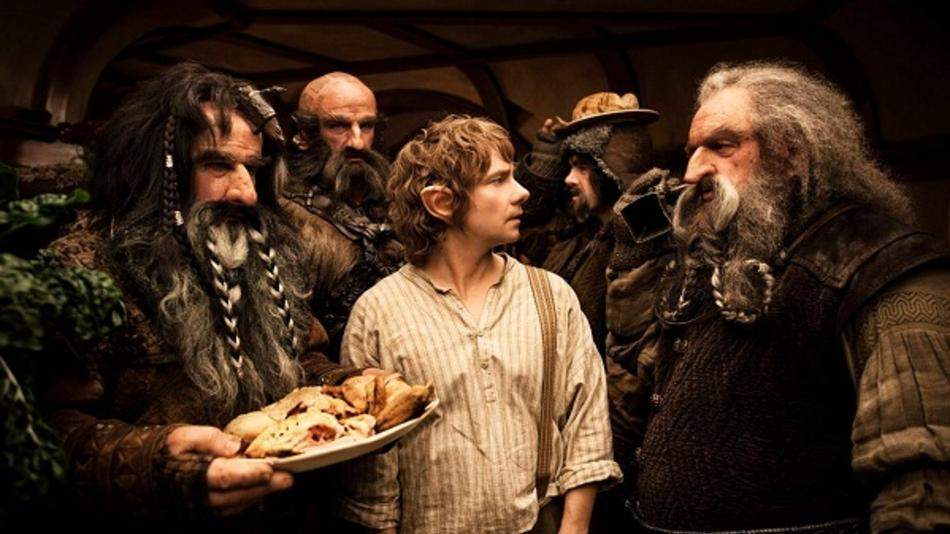The Hobbit
In the impressive first chapter of J.R.R Tolkien’s Lord Of The Rings prequel, Bilbo Baggins, Frodo’s “first and second cousin once removed either way”, takes an unexpected journey.
Overview
In the impressive first chapter of J.R.R Tolkien’s Lord Of The Rings prequel, Bilbo Baggins, Frodo’s “first and second cousin once removed either way”, takes an unexpected journey.
The Hobbit: An Unexpected Journey, the first installment in Peter Jackson’s three-part adaptation of the best-selling novel(the last of which is scheduled for release in July 2014), is a movie fans have been waiting for since the credits rolled on The Return Of The King nearly a decade ago. Somewhat unsurprisingly, it made 84.8 million US dollars in its opening weekend at the US box office, but critics across the world absolutely hated it. Why?
Bilbo Baggins (Martin Freeman) is a Hobbit. Not an elf, imp or sprite, but an entirely not at all similar member of the little folk that lives a peaceful, comfortable and well-to-do life in a hole in the ground. But “not a nasty, dirty, wet hole, filled with the ends of worms and an oozy smelly, nor yet a dry, bare, sadny hole with nothing in it to sit down on or to eat: it was a Hobbit-hole, and that means comfort”.
But all that changes when Gandalf (Ian McKellen) and thirteen dwarfs- Thorin (Richard Armitage), Balin (Ken Stott), Dwalin (Graham McTavish), Bifur (William Kircher), Bofur (James Nesbit), Bombur (Stephen Hunter), Nori (Jed Brophy), Ori (Adam Brown), Dori (Mark Hadlow), Gloin (Peter Hambleton), Oin (John Callen), Fili (Dean O’Gorman) and Kili (Aidan Turner)- turn up on his doorstep and employ him as an unlikely burglar on a dangerous quest to reclaim the lost dwarven kingdom of Erebor and evict the evil dragon that’s taken up residence there.
Thus begins The Hobbit: An Unexpected Journey, the first in a sequence of three films that’ll see the unadventurous and timid Bilbo trek through mountain depths and wastelands, take part in a deadly game of riddles and gain a simple gold ring with a connection to the fate of all Middle-Earth, and discover within him a courage and will to survive he never knew existed.
Peter Jackson has been criticised, perhaps rightly depending on who you ask, for extending The Hobbit, a four hundred page book, into three films totaling around nine hours in length. The argument of course being that by doing so he’s going against the original novel and adding a lot of padding that shouldn’t necessarily have been there.
But, really, is that a bad thing? In The Hobbit: An Unexpected Journey a number of things have been added that either weren’t in the book at all or didn’t play much of a part. These include Radagast The Brown (Sylvester McCoy), The Pale Orc, Azog (Manu Bennett) and a long backstory that pours nobility into the quest itself.
Peter Jackson pulled much of the extra material in the movie from The Lord Of The Rings appendices and, in doing so, he succeeded in making The Hobbit an exciting and multi-layered epic rather than just a children’s book adaptation like the arguably disappointing Narnia movies.
One of the finest things about An Unexpected Journey is the cast; Ian McKellen reprises his role as Gandalf The Grey and is as impressive as ever, Richard Armitage creates a darkly deep and complex leader in Thorin, Martin Freeman adds additional layers to the character of Bilbo making him relatable and interesting, and Aidan Turner becomes a future heart throb in the same vein as Legolas with his role as the bow-fighting dwarf Kili.
There’s a lot of talking in The Hobbit, in fact a large part of the beginning is dedicated to just that, but it isn’t at all boring. The clever casting, zany characters and dwarven songs absorb you into the movie and make you feel a part of it.
But as with any movie there are criticisms to be made about the movie. Well, one. Shot at 48 FPS as opposed to the 24 FPS rate that has been cinema standard for a century, the film has a much sharper image quality which mimics how we see the outside world. Though shooting at this frame rate means the picture is a lot better than it otherwise would’ve been, it also means that action sequences can be a little hard on the eyes. Critics have used this as a reason to attack the movie but, really, who cares?
There are some who would call An Unexpected Journey and its upcoming and already released sequels a little dull. That would complain the amount of talking and walking lower the pace of the story and drag it down. These people would be better served with movies more suitable for their less than capable minds like Anchorman, Twilight and The Hunger Games and, really, did they expect Peter Jackson to pop in a time machine and politely ask J.R.R Tolkien to rewrite the book so it more closely suits the needs of their goldfish-like attention spans?
Despite what some critics seem to believe The Hobbit: An Unexpected Journey is an outstanding movie verging on perfection, one that fully deserves to steal the show at The Academy Awards 2013 but, really, is that at all surprising?





